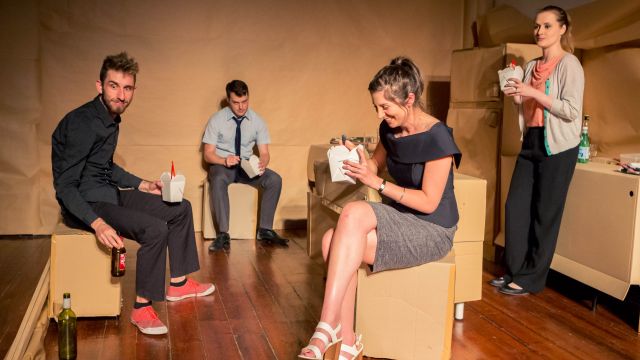A(f)fair Play
A bickering young couple, Trish and Craig (Lucy Norton and Remy Coll) prepares to welcome another young couple, Olivia and Sean (Anthea Greco and Sam Floyd) for dinner. Trish is snippy and brittle; Craig is jumpy and distracted. Olivia and Sean arrive. She’s shy and self-deprecating; he’s cocky and a little aggressive. The couples seem scarcely to know each other, but we quickly learn (spoiler alert) that Olivia and Craig are having an affair.
It seems we might be in Yasmina Reza territory, or somewhere close, but writer Sam Lloyd doesn’t have – or doesn’t yet have – the skill to manage the fine art of supposedly civilized urban types engaging in that sort of parlour terrorism where tensions mount and mount to the point of absurdity. In other words, A(f)fair Play isn’t quite sure what sort of a play it is (farce, psychodrama, sit-com?) and, despite a few much-too-late reveals, doesn’t really develop.
The flier for the show is quite clear: ‘Two jaded couples, four lovers and one absurd web of infidelity… a sharp contemporary nod to the much loved bedroom farce… [in which] four would-be adults scheme their way into each other’s pants.’ This reads like a PR blurb by someone who’d like the show to be this, but hasn’t actually seen it: it isn’t at all an accurate description and it’s not quite what happens. Would that it did.
This is a play that does fire intermittently to life and in which there are indeed sharp insights into human foibles, some witty and pointed banter and some touching emotion. But it is more successful when it addresses its conflicts head on than when it is too obviously being ‘funny’ for funny’s sake. Given these obstacles, the cast seems to display some uncertainty – for which they compensate by being over-emphatic about everything including their volume. They seem too aware that they’re in a comedy, so to speak. The essential quality of farce (if that’s what this is) is that the characters in it regard what is happening as not in the least amusing: they are struggling like crazy not to get caught.
Sam Lloyd, who happens to be the writer, gets away with it: he delivers his character’s sarcasm, barbs and dogmatic pronouncements at the right, off-hand pitch – as if he couldn’t care less about any effect he might have. Lucy Norton has real presence, but that uncertainty overtakes her too often. She rushes through some passages until she has clear space to command the stage – and then she’s very good. Anthea Greco plays her character at the most naturalistic level of the ensemble, but hers is the least developed character of the four. We never really find out why the hell Olivia would be having an affair – even if an unimportant one – with Remy Coll’s Craig. Mr Coll fatally plays his Craig as such a schlub and a bore that we soon are resigned to the fact that nothing much will happen.
A bare room that was the bar cum foyer at the Brunswick Mechanics is now the quite small but echoing playing space in which unfortunately the cast plays too big and too loud. Director Max Barker lets down his cast in this regard as with others. No set or lighting designer is credited in the program. This is probably wise.
A(f)fair Play is ambitious despite its small-scale intimacy. The mode or territory Mr Lloyd has chosen is extremely, deceptively difficult. He says in a program note: ‘I love a premise that creates a pressure cooker, and leaves its characters nowhere to hide. So we can get close enough to see the sparks and beads of sweat.’ Admirable intentions. Sadly not realised in this play. There’s no ‘pressure cooker’ since, unless someone blurts the truth, there’s almost no risk of the affair being discovered. The characters find places to hide all too easily. Mr Lloyd has the insight and the wit; the next show he does needs development and form. I’d go to see it, especially if he’s in it.
Michael Brindley
Subscribe to our E-Newsletter, buy our latest print edition or find a Performing Arts book at Book Nook.

